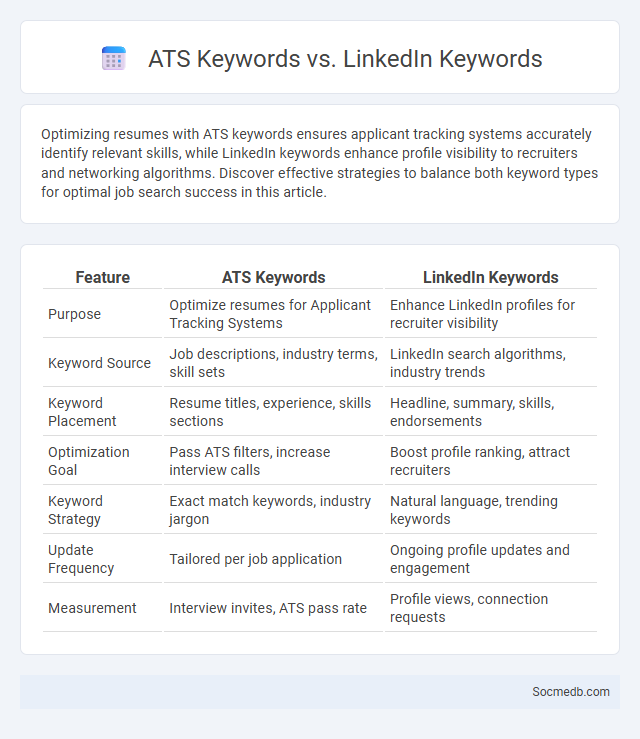
Photo illustration: ATS Keywords vs LinkedIn Keywords
Optimizing resumes with ATS keywords ensures applicant tracking systems accurately identify relevant skills, while LinkedIn keywords enhance profile visibility to recruiters and networking algorithms. Discover effective strategies to balance both keyword types for optimal job search success in this article.
Table of Comparison
| Feature | ATS Keywords | LinkedIn Keywords |
|---|---|---|
| Purpose | Optimize resumes for Applicant Tracking Systems | Enhance LinkedIn profiles for recruiter visibility |
| Keyword Source | Job descriptions, industry terms, skill sets | LinkedIn search algorithms, industry trends |
| Keyword Placement | Resume titles, experience, skills sections | Headline, summary, skills, endorsements |
| Optimization Goal | Pass ATS filters, increase interview calls | Boost profile ranking, attract recruiters |
| Keyword Strategy | Exact match keywords, industry jargon | Natural language, trending keywords |
| Update Frequency | Tailored per job application | Ongoing profile updates and engagement |
| Measurement | Interview invites, ATS pass rate | Profile views, connection requests |
Introduction to ATS Keywords, LinkedIn Keywords, and Keyword Optimization
Optimizing your LinkedIn profile and social media content with ATS keywords significantly boosts visibility to recruiters and hiring managers by aligning with automated screening systems used in job applications. Understanding keyword optimization involves researching industry-specific terms and strategically incorporating them into your headlines, summaries, and experience sections to enhance your profile's searchability. Leveraging LinkedIn keywords tailored to your target roles ensures that your profile matches relevant job descriptions, increasing the chances that Your professional brand stands out in competitive hiring markets.
Understanding ATS Keywords and Their Role in Job Applications
Understanding ATS keywords is crucial for optimizing job applications to pass Applicant Tracking Systems, which scan resumes for relevant terms related to skills, experience, and qualifications. Incorporating industry-specific keywords and action verbs increases the likelihood of a resume being flagged by ATS software, improving chances of progressing to the interview stage. Mastering ATS keyword usage enhances resume visibility in automated screenings, aligning candidate profiles with employer requirements effectively.
The Significance of LinkedIn Keywords for Career Visibility
LinkedIn keywords play a crucial role in enhancing your career visibility by aligning your profile with the specific terms recruiters and hiring managers search for. Incorporating relevant industry-specific keywords increases the chances of appearing in search results, helping you attract job opportunities and professional connections. Optimizing your LinkedIn profile with targeted keywords ensures your skills and experience are accurately represented and easily discoverable.
Key Differences Between ATS and LinkedIn Keywords
ATS keywords primarily target specific job-related criteria such as skills, qualifications, and experience to pass automated resume screenings. LinkedIn keywords focus on broader professional visibility, including industry terms, networking language, and endorsements that enhance your profile's discoverability. Knowing these distinctions helps you optimize your resume for ATS and tailor your LinkedIn presence for career growth.
Why Keyword Optimization Matters in Modern Job Searches
Keyword optimization plays a critical role in modern job searches by enhancing your profile's visibility in social media algorithms and recruiter searches. Using relevant keywords aligned with your industry and desired role increases the chances that your resume and posts will appear in targeted searches, connecting you with potential employers effectively. By strategically incorporating these keywords, you can ensure your professional brand stands out in a competitive online job market.
Strategies for Effective ATS Keyword Optimization
Employing targeted keyword research tools such as Jobscan and LinkedIn's job description insights enhances ATS keyword optimization by identifying role-specific terminology. Embedding relevant action verbs and industry jargon within a resume's skills and experience sections increases visibility in ATS algorithms, aligning with hiring manager expectations. Regularly updating keywords based on evolving job descriptions ensures continuous optimization, improving candidate ranking and interview opportunities.
Best Practices for Optimizing LinkedIn Profile Keywords
Incorporate industry-specific keywords naturally throughout your LinkedIn profile, focusing on your headline, summary, and experience sections to enhance search visibility. Use terms that align with your skills and target job roles, ensuring your profile appears in relevant searches by recruiters and potential clients. Updating keywords regularly based on trending terms within your profession will keep your LinkedIn profile optimized for LinkedIn's search algorithm.
Common Mistakes to Avoid in Keyword Optimization
Neglecting to research relevant keywords carefully often leads to poor social media visibility and engagement. Overstuffing posts with keywords can trigger platform algorithms to flag content as spam, reducing organic reach. Failing to analyze audience intent results in targeting irrelevant search terms, diminishing content effectiveness and ROI.
Tools and Resources for Keyword Analysis and Optimization
Effective keyword analysis and optimization for social media leverage tools like SEMrush, Ahrefs, and Google Keyword Planner to identify high-impact terms driving engagement and traffic. These resources analyze search volume, competition, and trending topics, enabling your content to rank higher and reach a targeted audience. You can enhance your social media strategy by consistently monitoring and refining keywords based on real-time data and platform-specific insights.
Conclusion: Maximizing Your Job Search with Smart Keyword Strategies
Maximizing your job search on social media requires strategically using industry-specific keywords to enhance visibility and attract recruiters. Tailoring your profiles and posts with relevant, high-impact terms aligned with your skills and target roles increases your chances of appearing in job-related searches. Using smart keyword strategies effectively positions you as a strong candidate in competitive online job markets.
 socmedb.com
socmedb.com